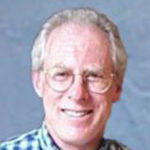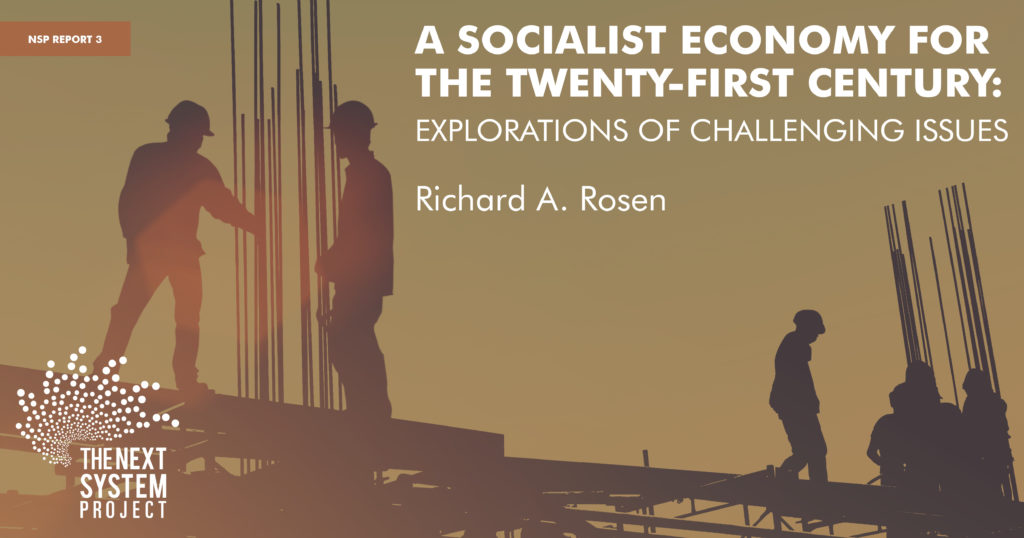A Socialist Economy for the 21st Century
PARADIGM CHANGES, 26 Dec 2016
Richard Rosen | The Next System Project – TRANSCEND Media Service
16 Dec 2016 – In Next System Project Report 3, author and Tellus Institute co-founder Richard A. Rosen explores the changes he deems necessary for a modern definition of “socialism”, and describes key concepts and issues that arise when aiming to restructure the American economy to include social and environmental sustainability in the Twenty-First Century.
To elucidate some of these concepts and issues, Rosen analyzes a set of economic sectors that have very different mechanisms and structures for determining prices, and very different environmental impacts, including: chemical manufacturing, small businesses, housing, defense manufacturing, nonprofit sector, agriculture, and finance. Through these seven-industry sector analyses, Rosen offers a number of changes to each– many of which are also applicable to the economy at large. More specifically, the author proposes a major transition to cooperative and public ownership followed by the adoption of new regulatory structures that are grounded in democratic participation (through Industrial Review Boards); heavily regulated – or even abolished – real estate markets; price and market adjustments that ensure social optimality; the recognition of certain sectors as “public service” in which profit should play no role; and the revival of small towns and cities to attract new farming families and to develop a system of sustainable agriculture across the country.
“Economic life in a modern so-called democratic society is much more complicated than it used to be, and life will need to get even more complicated if democracy is going to be strengthened in the future to meet pressing social needs.”
In addition to these proposals, Rosen outlines important lessons from the past. As he points out, one common theme among these sectors is the problematic feature of existing market structures for capital, as well as for goods and services. Consequently, he concludes that when restructuring the economy “markets cannot be the sole or even the major determinant of how we get where we want to go in any economic sector.” Another lesson is the need for new, stricter regulatory standards to ensure environmental protections and to mitigate climate change.
But just as important as Rosen’s proposed changes and lessons learned are the questions the author raises throughout his report to ensure an effective restructure of American economy. In suggesting areas where additional research is required, A Socialist Economy for the Twenty-First Century is a concerted effort to further advance the system change conversation, and presents a framework for thinking about a new economy that takes environmental sustainability and social justice into consideration.
Download the Full Report
______________________________________
 Dr. Richard A. Rosen received a Ph.D. in theoretical physics from Columbia University in 1974. Soon thereafter, Dr. Rosen switched his area of research to energy systems and energy policy at the Department Of Energy’s Brookhaven National Laboratory in New York. In 1977 he helped to found what became the Tellus Institute, and has pursued his research and consulting interests there in the fields of energy policy, economic system alternatives, electric utility policy, planning and operations, and climate change economics and policy. Dr. Rosen has written or coauthored dozens of reports, papers, and items of testimony that he presented before professional conferences, public utility regulatory proceedings, federal courts, and in peer-reviewed scientific journals.
Dr. Richard A. Rosen received a Ph.D. in theoretical physics from Columbia University in 1974. Soon thereafter, Dr. Rosen switched his area of research to energy systems and energy policy at the Department Of Energy’s Brookhaven National Laboratory in New York. In 1977 he helped to found what became the Tellus Institute, and has pursued his research and consulting interests there in the fields of energy policy, economic system alternatives, electric utility policy, planning and operations, and climate change economics and policy. Dr. Rosen has written or coauthored dozens of reports, papers, and items of testimony that he presented before professional conferences, public utility regulatory proceedings, federal courts, and in peer-reviewed scientific journals.
Go to Original – thenextsystem.org
DISCLAIMER: The statements, views and opinions expressed in pieces republished here are solely those of the authors and do not necessarily represent those of TMS. In accordance with title 17 U.S.C. section 107, this material is distributed without profit to those who have expressed a prior interest in receiving the included information for research and educational purposes. TMS has no affiliation whatsoever with the originator of this article nor is TMS endorsed or sponsored by the originator. “GO TO ORIGINAL” links are provided as a convenience to our readers and allow for verification of authenticity. However, as originating pages are often updated by their originating host sites, the versions posted may not match the versions our readers view when clicking the “GO TO ORIGINAL” links. This site contains copyrighted material the use of which has not always been specifically authorized by the copyright owner. We are making such material available in our efforts to advance understanding of environmental, political, human rights, economic, democracy, scientific, and social justice issues, etc. We believe this constitutes a ‘fair use’ of any such copyrighted material as provided for in section 107 of the US Copyright Law. In accordance with Title 17 U.S.C. Section 107, the material on this site is distributed without profit to those who have expressed a prior interest in receiving the included information for research and educational purposes. For more information go to: http://www.law.cornell.edu/uscode/17/107.shtml. If you wish to use copyrighted material from this site for purposes of your own that go beyond ‘fair use’, you must obtain permission from the copyright owner.
